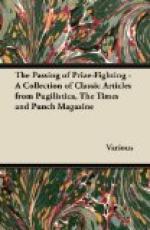After the luncheon interval Mr. Cyril Blunt read a report, which he had prepared at the request of the Commission, on the Nationalisation of the Folk-song Industry. He said that it was a scandalous paradox that this natural and obvious reform had hitherto been successfully resisted by unscrupulous individualistic action. Folk-tunes were the product of and belonged to the People, but they had been seized, exploited and perverted by composers, who should be forced to refund the profits they had derived from their robbery. The conservation of our national musical resources should be jealously guarded, and the collection, notation and harmonisation of these tunes carried on under rigorous State supervision. At the same time the State might issue licences for the symphonic use of folk-tunes, the profits from the sale of these licences to be devoted to the maintenance of village festivals, at which only genuine folk-music should be performed by the oldest inhabitants.
Asked by Sir Mark Holloway what he meant by genuine folk-music, Mr. Blunt said, “Tunes of which it is impossible to assign the authorship to a known composer.”
Mr. Kilcrankie Fox, who was the next witness, was subjected to a very searching examination by Mr. Moody MacTear, Mr. Gladney Jebb and Sir Leonardo Spaghetti Coyne.
Mr. Moody MacTear. Are you aware that brass instrument players are habitually sweated in orchestras and bands?—It depends on what you mean. I certainly admit that their activities often conduce to profuse perspiration.
Mr. Moody MacTear. Have you ever played the trombone yourself?—No, nor the lyre either.
Mr. Gladney Jebb. Are you prepared to deny that the strain on the nerves of players in Jazz-bands, especially drums, is greater than that endured by soldiers in the front-line trenches during an intense bombardment?—As a rule I am prepared to deny at sight any statement for which you are responsible, but I concede you the big drum.
Sir Leonardo Spaghetti Coyne. Are you aware that, owing to profiteering in the cloth trade, organ-grinders have been unable to provide their Simian assistants with proper habiliments during the recent inclement weather?—“Apes are apes though clothed in scarlet”—or broadcloth. I have not noticed any shabbiness of late in the garb of those with whom I am acquainted.
The Commission broke up at a late hour. At the next meeting evidence will be taken on the subject of the housing of musical seals and the alleged profiteering of dealers in burnt cork at the expense of players in Jazz-bands.
* * * * *
[Illustration: Waiter (a demobilised Sergeant—as Staff officer enters). “ROOM—’SHUN!”]
“FOR SALE,
STANDARD BABY.
Lately overhauled.”
Cape Times.
Inhuman, we call it.
* * * * *




